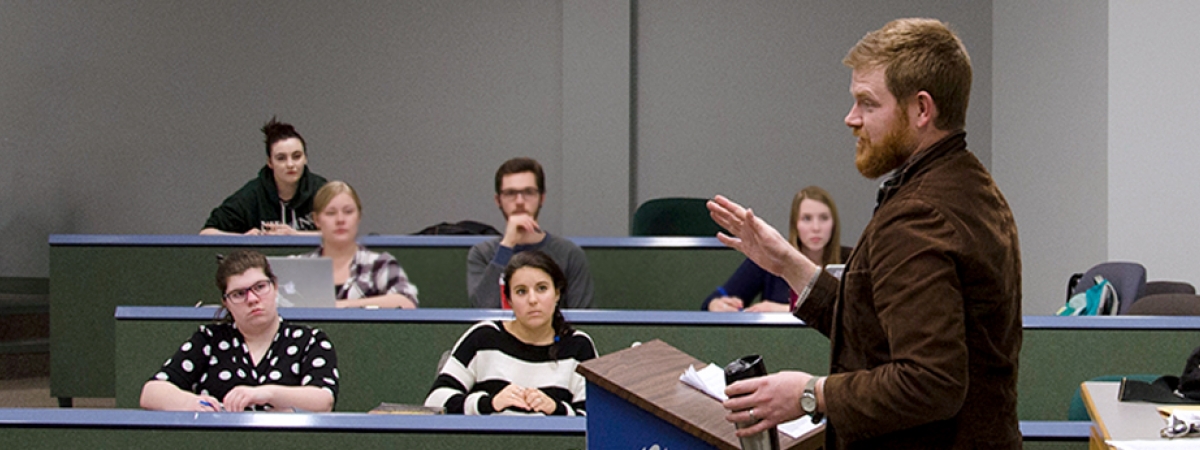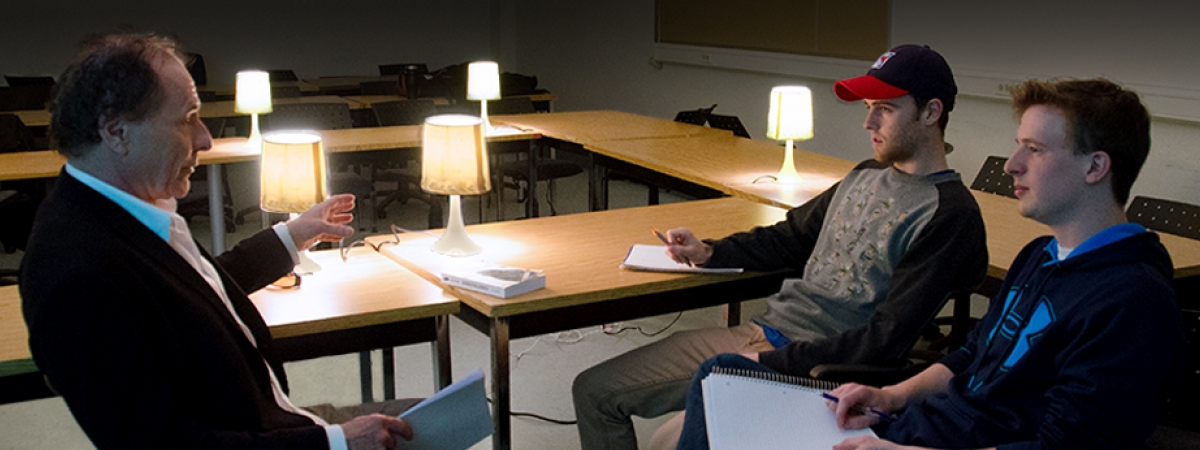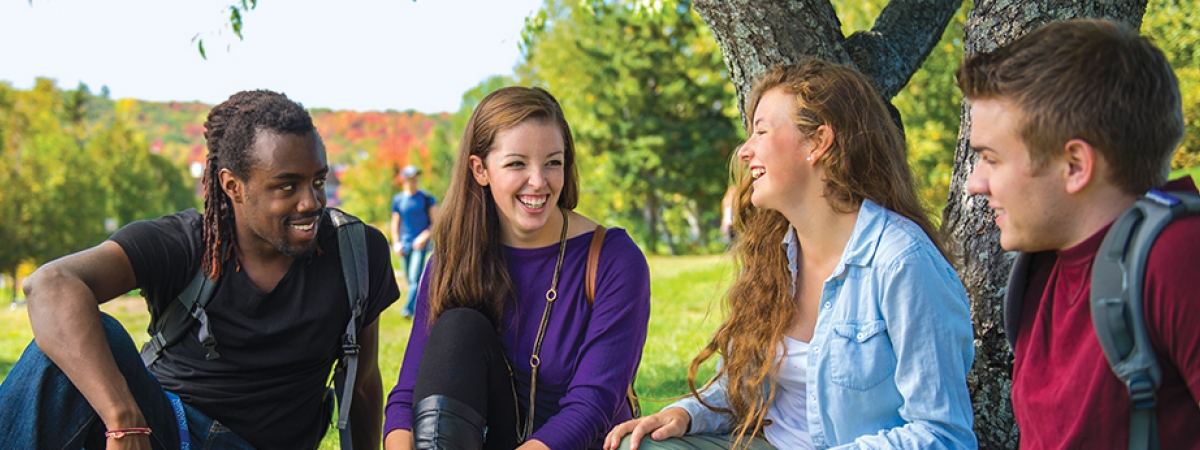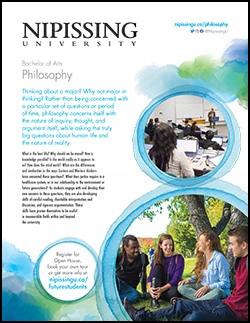Welcome to Philosophy at Nipissing
Thinking about a Major? Why not Major in Thinking? Rather than being concerned with a particular set of questions or a particular period of time, philosophy concerns itself with the nature of inquiry, thought, and argument itself, asking how each of these operates in the various areas of human life, from ethics and politics to the study of nature and reality. This means that philosophy students take up the truly big questions: What is the best life? Why should we be moral? How is knowledge possible? Is the world really as it appears to us? How does the mind work? At the same time, the skills students develop in pursuit of a degree in philosophy – careful reading, charitable interpretation and discussion, and rigorous argumentation – have proven themselves to be useful in innumerable fields within and beyond the university.
The Philosophy Program at Nipissing is small and student-focused: with an average of 35 full-time majors, students get to know and work closely with both their professors and their peers. The department is particularly committed to introducing students to the history of philosophy, from the ancient period to the present. The program is designed to work well either as a stand-alone degree or as a combined degree with other programs, and there are numerous philosophy courses offered each year that do not have prerequisites and that are popular electives for students in other programs.
Philosophy at Nipissing University
Some especially popular courses include:
PHIL 1116: Introduction to Western Philosophy
Students are introduced to the main concerns in the discipline of Philosophy within the Western tradition. Beginning with the ancient Greeks and ending with the 20th century, students explore some of the most significant issues that have engaged philosophers during each of the main periods of the long and complicated history of Western Philosophy.
PHIL 1117: Values and the Human Condition
Students are introduced to some of the most important themes in the theory of value. While the specific topics and texts will vary each year, students can expect to critically explore fundamental questions about what it means to be a human being, the significance of human diversity, and the role of values in human life.
PHIL 2507: Bullshit, Bias, and Propaganda: Reasoning about the Irrational
Students explore historical and contemporary work in social epistemology, including the nature and limits of public reason, forms of bias in human thinking, and organized efforts at irrational persuasion including bullshit and propaganda.
PHIL 2716: Bio-Ethics
Students will examine bio-ethical issues emerging in therapy, research, public policy, and law. The course will include a brief discussion of perspectives in moral philosophy; however, the bulk of the course will deal with specific debates within bio-ethics. Topics to be discussed may include the role of well-being and care in moral argumentation; the moral significance of biological life; patient autonomy and questions of competence and consent; cultural diversity and medical ethics; end-of-life issues, such as euthanasia and the definition of death; abortion; genetic manipulation, screening, and eugenics; the ethics of medical experimentation and research; the question of a right to healthcare; and the application of principles of distributive justice to scarce medical resources. This course may be credited towards Religions and Cultures.
PHIL 2717: Environmental Ethics
Students examine important historical positions as well as recent developments in moral philosophy as they are applied to questions of environmental practice and the moral status of the environment. Topics to be discussed may include: the moral status of nonhuman nature; duties to respond to climate change, including issues of intergenerational justice and collective responsibility, as well as consideration of the social construction of the natural; economics and sustainability; deep ecology; and environmental activism and eco-terrorism.
PHIL 2816 Digital Ethics
Students examine ethical issues that have emerged in relation to digital technologies, such as: the meaning and value of privacy; the right to be forgotten; the power of search engines; the use of Big Data and Big Data analytics; equality and the “digital divide”; censorship and free speech online; the ethics of the online self, including questions of reification, catfishing; polarization and the internet; artificial intelligence; and the ethics of hacking and hacktivism.
Nipissing University Philosophy Society (NUPS)
Get involved beyond the classroom, the Nipissing University Philosophy Society is a monthly gathering where you can hang out with your peers and discuss ideas.
Facilities
Nipissing's campus is located on a stunning 291 hectares of Canadian Shield forest. With our focus on student-centred living and learning, you will feel a sense of community the moment you step on campus.
The Harris Learning Library
The Harris Learning Library was completed in 2011 and provides 56,000 square feet of study space with natural light and a modern award-winning design. The new library features expanded print collections, a learning commons, an adaptive technology area, and collaborative work spaces.
Academic Support Services
Our goal is to support your academic and personal development. Look for assistance with accessibility services, learning style assessments, writing skills, writing formats, study strategies, time management, note-taking skills, academic resources, group seminars, peer support, career development activities, and more. Learn More...
Financial Support Services
Achieve your goals on time and on budget. We’ll help you fund your education through scholarships, awards, bursaries, government assistance, and work study programs. Learn More...
Internationalize your Degree
If you want to experience a year or a semester at one of our partner schools across the globe, we have support services and programs to help you get there. If you want to assist International students with adjusting to life in Canada, we’ll connect you. Check out your options...
Personal Counselling Services
Our registered counsellors offer free, year-round personal counselling services, specialized therapeutic groups, referral services and a host of wellness, educational and awareness events to all full- and part-time undergraduate and graduate students. Learn More...
Residences
Our top-rated residences will make you feel right at home. You will make fast friends with your residence community. Our student leaders, Residence Dons, and award winning residence staff give tutorials on everything from the basics of laundry and cooking to making connections within the community. Learn More...
“I hear and I forget, I see and I remember, I do and I understand.” Confucius
Experiential learning is an effective medium that enhances and reinforces classroom learning. In addition, skills and competencies in the areas of communication, teamwork, analysis, work ethic, and problem solving are all learning outcomes that assist with finding the right career path for you.
Third and fourth year Arts and Science Students will be interested in our 3 credit course, UNIV 3006 Experiential Learning for Arts and Science Students. Within this course, academic assignments and at least 60 hours of placement in the community within a field that is related to your course of study is offered.
Leadership and Community Engagement
If you are eager to get involved beyond the classroom, take part in the annual Undergraduate Research Conference, which gives you the opportunity to present your work to peers, professors, and family members. You may also have opportunity to work as a Research Assistant to help a professor conduct research and gain valuable experience at the same time.
Record of Student Development
Your experience at Nipissing University is more than just the time spent learning great things in lectures, labs, and seminars. It’s also about the activities you are involved in outside of the classroom, the causes you champion to make change on campus, the clubs you organize, the awards you receive, the workshops you participate in, the volunteering you do, and all the learning that occurs outside of the classroom.
The Record of Student Development (RSD) is Nipissing University's way of recognizing that learning is happening everywhere on campus. It is a formal record, otherwise known as a co-curricular transcript, where you can include workshops, volunteer experiences, awards, activities, and on campus employment experiences that you participate in throughout your degree.
Each RSD Approved activity in our database is linked to competency areas employers are looking for such as:
- Critical Thinking
- Leadership
- Digital Literacy
- Equity and Diversity
- Emotional and Interpersonal Intelligence
- & more!
To see the full list of competencies and get started building your Record of Student Development go to: rsd.nipissingu.ca
Nipissing University Student Union (NUSU)
Students attending Nipissing University in North Bay and long distance students are members of the Nipissing University Student Union. Our organization strives to represent students democratically, provide a communication framework, and lobby for legislative change on issues that affect students.
Athletics
Exercise and healthy competition always help to clear the mind.
INTRAMURAL SPORTS
Nipissing’s Athletics Department offers a wide range of intramural activities to keep you on your game
LAKERS CLUB SPORTS
Club sports are available to all Nipissing students and are both recreational and competitive.
VARSITY SPORTS
Go Lakers! Our varsity athletes always bring their “A” game. Get your friends together and come out to cheer on your favourite teams.
STUDENT ATHLETICS CENTRE
Whether you are a gym enthusiast or a weekend warrior, Nipissing has just what you need.
Nipissing Philosophy graduates go on to very successful careers. So far, all of our students who have applied to Masters programs have been accepted—often with scholarships! Philosophy is excellent preparation for law school, and our grads typically score very well on the Law School Admission Test (LSAT), thanks to the skills they develop during the program.
Philosophy students become particularly good at thinking outside the box. Because of this, many of our students have gone on to successful careers in business, where original thinking is valued. But your skills will transfer well to many other kinds of careers, including environmentalist, journalist, researcher, activist, and much more.
Career and Academic Options
- Graduate Studies
- Professional School (Education, Law, MBA)
- Careers in journalism, administration, government, and social work
For an interesting look at how the modern world views the worth of a philosophy degree, take a look at these articles: |







